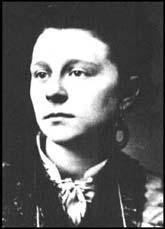Clara Harris

Clara Harris, the daughter of the New York senator, Ira Harris, was born in 1845. When her mother died her father remarried the mother of Major Henry Rathbone.
On 14th April, 1865, Mary Lincoln, the wife of Abraham Lincoln, invited Clara and Henry Rathbone, to the Ford Theatre to see the play Our American Cousin .
John Parker, a constable in the Washington Metropolitan Police Force, was detailed to sit on the chair outside the presidential box. During the third act Parker left to get a drink. Soon afterwards, John Wilkes Booth, entered Lincoln's box and shot the president in the back of the head. Henry Rathbone grabbed Booth but he was slashed with a hunting knife. Despite a bad wound in his left arm, Rathbone continued to struggle with Booth and as a result he was unable to jump cleanly from the State Box. Booth then jumped to the stage eleven feet below at an awkward angle and as a result fractured his ankle. However, he was able to hobble out and get on his horse and escape.
In 1867 Clara married Henry Rathbone and over the next few years the couple had three children. When Grover Cleveland became president he appointed Rathbone as his consul to Germany.
Rathbone's behaviour became more erratic and he appeared to become jealous of his wife's attentions to the children. On 23rd December, 1883, Rathbone murdered Clara and attempted to commit suicide. He survived and after being found guilty of murder was committed to an asylum for the criminally insane. Henry Rathbone died in the asylum in 1911.
Primary Sources
(1) Rose O'Neal Greenhow, diary entry (25th March, 1862)
General Dix said: "You are charged, madam, with holding communication with the enemy in the South."
"If this were an established fact, you could not be surprised at it. I am a Southern woman, and I thank God that no drop of Yankee blood ever polluted my veins; and as all that I had ever honored or respected have been driven by ruthless despotism to seek shelter there, it would seem the most natural thing in life that I should have done so."
"How is it, madam, that you have managed to communicate in spite of the vigilance exercised over you?"
"That is my secret, sir; and, if it be any satisfaction to you to know it, I shall, in the next forty-eight hours, make a report to my government at Richmond of this rather farcical trial for reason."

